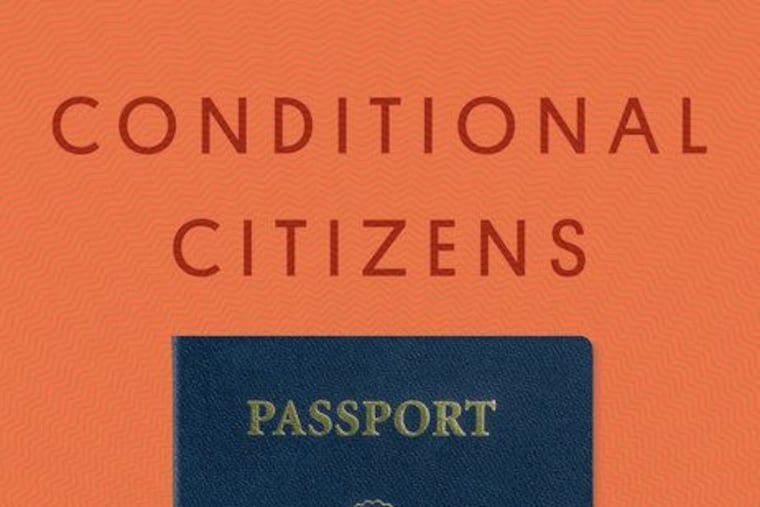'Conditional Citizens’: The Americans who still aren’t seen as fully belonging | Book review
Novelist Laila Lalami’s new collection of essays offers a searing look at the struggle for all Americans to achieve liberty and equality.

Conditional Citizens: On Belonging in America
By Laila Lalami
Pantheon. 191 pp. $25.95
Reviewed by Rachel Newcomb
The Constitution guarantees equal rights to all U.S. citizens, yet for some Americans, these ideals exist only on paper. Novelist Laila Lalami’s new collection of essays, Conditional Citizens: On Belonging in America, offers a searing look at the struggle for all Americans to achieve liberty and equality. Lalami eloquently tacks between her experiences as an immigrant to this country and the history of U.S. attempts to exclude different categories of people from the full benefits of citizenship.
Her own “relationship to the state” is clouded by arbitrary parts of her identity over which she has no control: The author of The Other Americans and other novels is “an immigrant, a woman, an Arab, and a Muslim.” “Conditional citizens,” she writes, “are people whose rights the state finds expendable in the pursuit of white supremacy.” The history of conditional citizenship begins at the founding of the United States, with privileges such as voting guaranteed only to white male land owners. After the elimination of slavery, American Blacks fought an uphill battle against legal disenfranchisement. Naturalization for nonwhite immigrants was either denied or limited by quota systems until the Immigration Act of 1965. Even Indigenous Americans were conditional citizens, displaced whenever natural resources were found in their territories, despite hundreds of treaties signed with the government.
Immigrants who are the same race or religion as a political enemy of the moment, such as Japanese Americans during World War II, or Muslims since the Sept. 11, 2001, attacks, often find themselves facing sharp — sometimes violent — discrimination. As a public figure, Lalami frequently is asked to explain terrorism, as if all Muslims have a deep understanding of the inner workings of the Islamic State. Lalami notes that her cultural identity derives from a mixture of Arab, Muslim, and French practices she absorbed growing up in Morocco. Muslim Americans have divergent histories that do not easily collapse into a monolithic entity usually presumed to be guided by faith alone. As with other ethnic groups that have been profiled and demonized for political reasons, “the complexity of a multitude of private experiences is erased and replaced by a single public story, which grows more convincing with each repetition,” she writes.
Lalami offers a fresh perspective on the double consciousness of the immigrant. She notes that it’s possible to love one’s adopted country and still experience sadness at the loss of one’s birth culture. “All immigrants walk around with a scar left behind by their crossing into a new country, an invisible mark of the exile that became their condition when they were uprooted,” she writes. “Their children grow up without grandparents, without aunts and uncles and cousins, without a reservoir of collective family memory passed down through generations. While immigrants nurse this immense loss, they are told that they must adjust and belong by giving up even more of their culture.”
Citizenship, Lalami observes, should entail being able to simultaneously exhibit patriotism and point out injustices. Yet immigrant citizens who criticize policies are likely to be shut down with the admonition that they should return to their countries. Lalami reminds readers that women living in democracies who raise questions about gender discrimination are often told that they “should be grateful for the rights they have” in comparison with women in other countries who suffer from a range of extreme practices such as genital mutilation, child marriage, and femicide. This “facile argument,” Lalami asserts, discourages “women from trying to reach full equality with men.”
Lalami develops a strong link throughout her book between nonwhite racial identity and conditional citizenship. American Blacks have always faced higher risks of arrest, incarceration, and discrimination in every area, whether they are applying for housing loans or seeking the right to vote. Although the 14th Amendment, ratified in 1868, guaranteed citizenship to those born in the United States, Native Americans would not gain the right to citizenship until 1924. Because voting rights are controlled at the state level, they had to battle for this right state by state. Lalami also examines the curiously arbitrary racial categories in U.S. censuses, which lump some groups, such as Arabs, into the “white” category even though socially they experience discrimination and mistreatment, just as other minorities do. As a “seductive fiction,” Lalami asserts, race “ensnares both the dominant and nondominant groups into a narrative that they can scarcely escape, reinforced as it is by the culture, a narrative that teaches them that their success or failure is due exclusively to their individual efforts and that history plays no part in it.”
Newcomb is a professor of anthropology at Rollins College in Winter Park, Fla. She wrote this for the Washington Post.